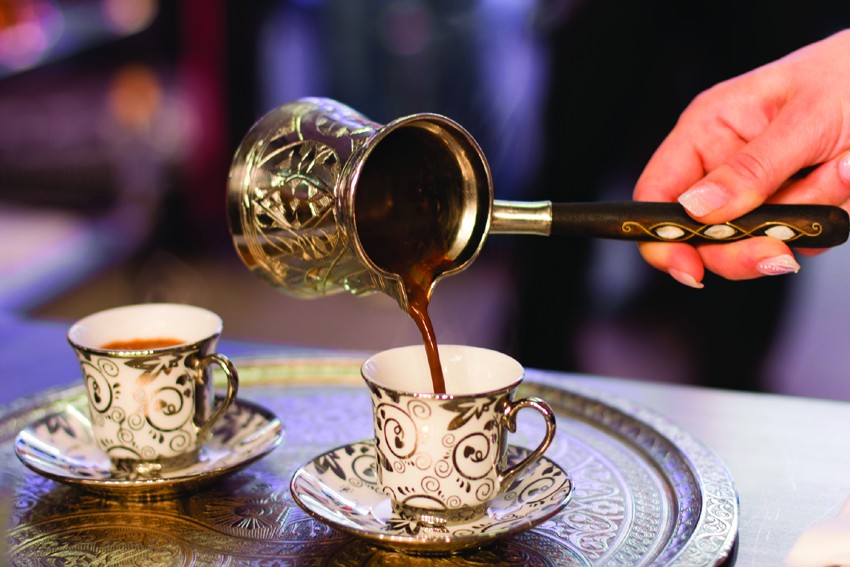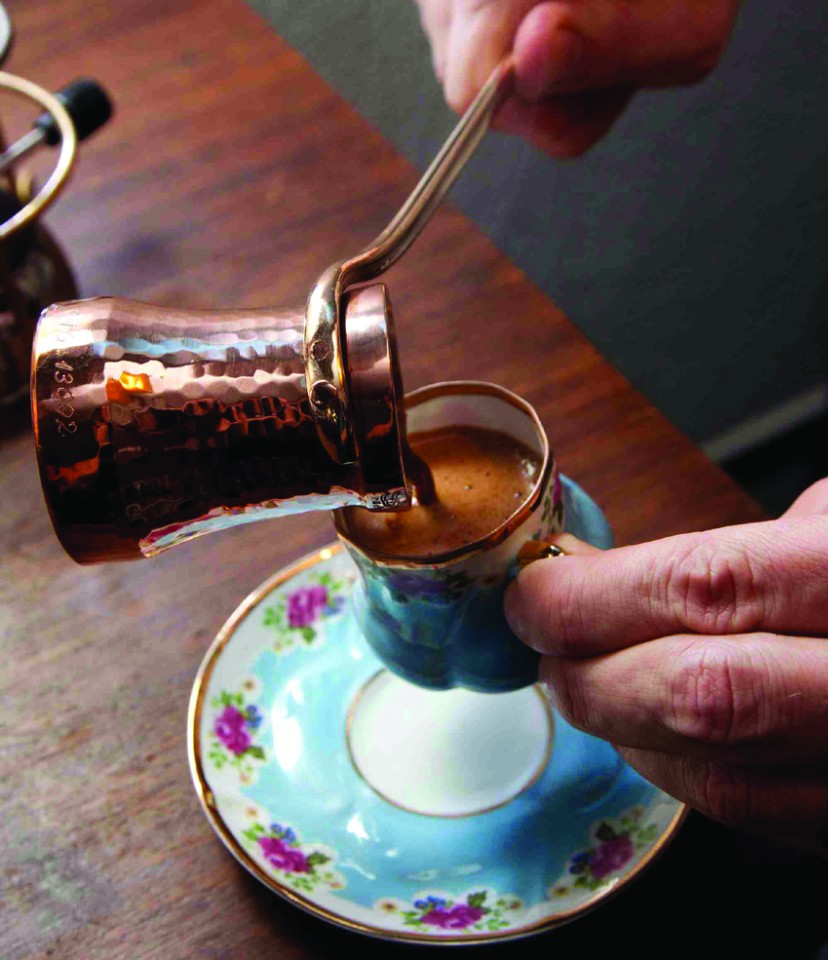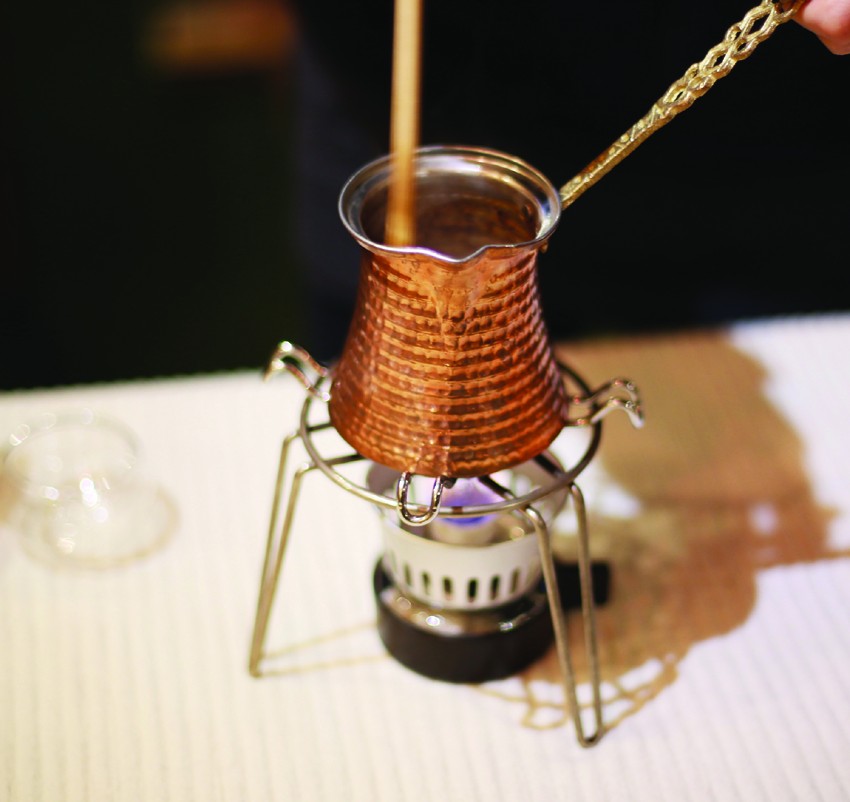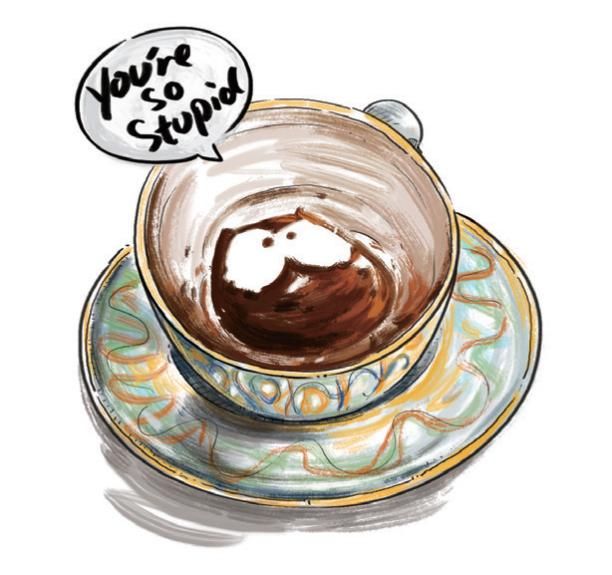How is Turkish coffee made?
For professional baristas, please follow the coffee workshop (Wechat official account cafe_style)
In the sixth and seventh centuries, the Gella people in Ethiopia began to eat coffee fruits and boiled grass leaves; in the ninth century, Persians cooked coffee fruits and used fruit juices as medicine By the middle of the fifteenth century, it became popular in Yemen to grind the coffee beans in the fruit and cook them together with the pulp, known as "Kawa", and spread to Turkey. The weather in Turkey is hotter than that in Yemen, and the coffee pulp is not easy to preserve. So the coffee beans are roasted and ground to make coffee. Turkish coffee is one of the oldest methods of extraction.

The utensils used to make Turkish coffee are called Ibrik and Cezve. Strictly speaking, the Evelick kettle, which means "water canister" in Turkish, is an instrument with a lid that looks close to a long-nosed pot. The cut crape myrtle pot, which means "burning firewood / coal" in Greek, is made of pure copper with a long handle. However, when it comes to Turkish coffee utensils in China, they are collectively referred to as Yvlik pots.

The earliest blended coffee
Coffee was first drank without sugar in the Middle East, until after the mid-16th century, when the Turks occupied the sugar-producing island of Cyprus, aristocrats and rich people began to add sugar to their coffee. In addition to granulated sugar, different countries will be mixed with different spices, such as cinnamon, cloves and so on. Come to think of it, the ancestor of all kinds of fancy coffee today is Turkish coffee.
Modern Yvlik kettle
The Yvlik pot was originally made of good pure copper with good thermal conductivity, but later, products made of other materials such as stainless steel or ceramics also appeared. Recently, the Yvlik kettle, which is not only made of material, but also has a modern design, has been launched on the market recently, and the heat source has also expanded from alcohol lamp to gas stove, mountaineering gas stove, black crystal stove, and so on. Even in Turkey, there is a shop hot kettle type of Evelick kettle, which can be called a coffee utensil that embodies the traditional spirit in a modern way.

The ancient coffee culture
Coffee has been rooted in Turkish life since the Ottoman Turkish Empire. At that time, men had to prepare coffee for the whole family, which was the responsibility of parents. If it is not fulfilled, the wife even has the legal right to divorce. In aristocratic families, some have servants who specialize in making coffee. Midwives also use coffee as a painkiller to relieve maternal labor pains. The parents of the Turkish groom will visit the bride-to-be's home, taste the coffee cooked by the bride-to-be, and decide whether or not to get married according to the taste of the coffee.
The origin of the word "Cafe" also comes from Turkey. In 1554 Constantinople, the capital of the Ottoman Empire, appeared a "Kabeh" decorated with carpets, gems and tiles, specializing in cooking Turkish coffee. After "Kabeh culture" spread to Europe, "Kabeh" became the etymology of "coffee" and "Cafe".

The bridge of dialogue: coffee divination
Turkish coffee usually leaves the last sip, and most people are ungrateful to the coffee dregs, but the Turks sublimate the coffee grounds into a culture. when the coffee is left with the last sip, they think about what they worry about or want to know. While slowly shaking the coffee cup, buckle it upside down on the coffee plate and wait for the cup to cool, then turn the cup over and observe the remaining coffee powder pattern in the cup for divination. Whether or not to be sure is one thing. For Turks who attach importance to interpersonal relationships, coffee divination serves as a good communication bridge and provides the theme of dialogue.

The principle of coffee divination is to watch the patterns formed by the residue after drinking coffee to predict things, similar to the Rorschach Inkblot test in psychology. And there is something particular about this kind of coffee divination in Turkey:
1. The coffee used for divination must be full-bodied Turkish coffee without sugar, milk or other foods.
two。 Drinkers can only hold the coffee cup in their right hand and drink coffee from one side of the cup.
3. Second, Tuesdays and Fridays are best for coffee divination, while Sundays, holidays or holidays are not.
4. Turkish coffee divination can only predict what will happen in the next 40 days. As a result, what happens forty days later cannot be predicted.
(divination steps)
1. After drinking the coffee, leave some coffee at the bottom of the cup, and then cover the plate over the coffee cup.
two。 Shake the cup and plate slightly, rotate counterclockwise a few times, think about the problem of divination, and then carefully buckle the cup and plate back.
3. Place the cup and plate on the table and wait for the temperature at the bottom of the cup to drop. At this point, you can put a coin or ring on the cup to speed up the cooling and dispel ominous signs that may be read from the coffee cup.
4. Open the cup carefully and you can start divination for the patterns in the cup.

(result analysis)

▲ full Moon: congratulations on becoming a lucky person. You will be blessed by God recently. Pursue your goals confidently.

▲ crescent: the recent period of low pressure, everything should be cautious, deal with others with a modest attitude to face, impatience is easy to be bad, should be handled patiently.

▲ heart shape: pack up the mood, dress yourself carefully, love is coming!

▲ three-day moon: something bad may happen, adjust your mindset to tide over the difficulties.

Whether it is for after-dinner entertainment or to find a professional diviner to predict good or bad luck, coffee cup fortune telling is an important feature of Turkish coffee. People can see hints on all aspects of life in a cup of Turkish coffee, and talking to friends about the abstract symbols in coffee cups is also a cure, which is the most suitable relaxation game after drinking coffee.
Important Notice :
前街咖啡 FrontStreet Coffee has moved to new addredd:
FrontStreet Coffee Address: 315,Donghua East Road,GuangZhou
Tel:020 38364473
- Prev

Rwanda Musasa Cooperative introduces the flavor description of washed red bourbon cup.
For the exchange of professional baristas, please follow the coffee workshop (Wechat official account cafe_style) Red Bourbon-Musasa Cooperative Rwanda is located in the heart of the interior of Africa. Coffee was introduced by German missionaries in 1904, and cultivation began to flourish in 1930 because it was the only income-earning crop for rural farmers, whether it was Arabica harvested between March and June.
- Next

Sidamo-Shirley (SHILICHO) cooperative G1 waterwashed bean baking recommended flavor adjustment
Professional barista exchanges please follow the coffee workshop (Wechat official account cafe_style) Ethiopia Sidamo-Shirley (SHILICHO) Cooperative G1 washed beans Fair Trade Association Ethiopia is the country where coffee was first discovered, there is still a lot of wild coffee for farmers to harvest in the primeval forest. Ethiopia is a country of poverty, drought and civil war.
Related
- Beginners will see the "Coffee pull flower" guide!
- What is the difference between ice blog purified milk and ordinary milk coffee?
- Why is the Philippines the largest producer of crops in Liberia?
- For coffee extraction, should the fine powder be retained?
- How does extracted espresso fill pressed powder? How much strength does it take to press the powder?
- How to make jasmine cold extract coffee? Is the jasmine + latte good?
- Will this little toy really make the coffee taste better? How does Lily Drip affect coffee extraction?
- Will the action of slapping the filter cup also affect coffee extraction?
- What's the difference between powder-to-water ratio and powder-to-liquid ratio?
- What is the Ethiopian local species? What does it have to do with Heirloom native species?

